STRANGLING PARADISE
Bangaram Atoll, Laccadive Islands, India. Welcome to the Strangled Paradise. Sure looks beautiful doesn’t it?
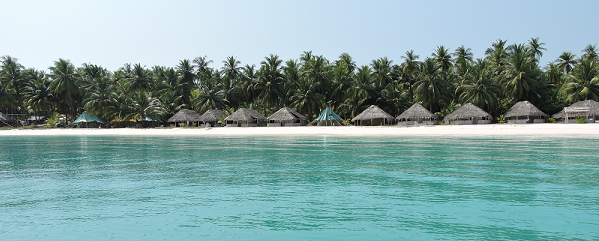
Thatch huts under swaying palms, perfect white sand beach, crystal clear water of translucent turquoise. Do you wish you were here?
Don’t.
The picture is real – I just took it. This place could be a real dream-paradise, but it’s not. And there is a very clear reason why.
The Laccadive Islands – laquedives, glossy or laquer islands for the calm turquoise sheen of the water – were originally joined with the Maldive Islands under the British Raj of India. Indeed, the sea that encompasses both is called the Laccadive Sea.
The first inhabitants of both were Buddhists from Southern India well over 2,000 years ago, and subsequently subjected to Moslem rule some 900 years ago. When the Brits defeated the Moslem Sultan ruling much of southern India in the late 1700s, they got the Laccadives. 100 years later, the Sultan of the Maldives turned his islands into a British Protected State.
When the Brits abandoned their Raj in the disaster of Partition in 1947 (see The Lunacy of a British Legacy, July 2006), they kept the Maldives but gave the Laccadives to India as it was too far away from the former to administer. The Brits gave full independence to the Maldives as its own sovereign country in 1965.
In 1973, in keeping with the silly India practice of changing historical names into phony names (Bombay to Mumbai, Calcutta to Kolkata, all of which I refuse to acknowledge), the Laccadives were renamed “Lakshadweep,” a made-up term meaning “100,000 islands” in Sanskrit – albeit that there are only 37 islands and islets, only 10 being inhabited.
Since then, the Maldives have steadily become prosperous by converting their unknown distant islands into spectacularly beautiful and welcoming tourist meccas. Just take a look at Google Images of the Maldives to see how spectacular. Meanwhile, the Laccadives have languished with their people mired in poverty. Why?
Because the Indian government wants it that way. The life-purpose of bureaucrats everywhere is to enhance their power rather than people’s prosperity.
There’s only one airport, on Agatti, and flights only from Kochi on the mainland. Tourists are not allowed to stay there, however, even though the Agatti beaches are gorgeous. You’re only allowed to visit Bangaram, Kadmat, and Amini. All the other islands are closed.
Why?
Because the Indian government wants the islanders isolated from the world.
The islanders are ordinary folk, Moslems like elsewhere in India (India has the second largest Moslem population in the world behind Indonesia and more than Pakistan), with no tribal cultures that need to be preserved and protected.
The people of the Maldives are just the same, virtually 100% Moslem, who were impoverished subsistence fishermen – until they opened the gates to tourism. The world’s biggest industry, that provides more jobs and makes more money than any other on earth, is tourism. Airlines, hotels, restaurants, rental cars, cruises, conferences, on and on – put it all together and no other industry comes close.
And it runs on a particular fuel. Just as cars, buses, trucks, ships and airplanes run on oil – gasoline, diesel, jet fuel, etc. – tourism runs on booze. What would happen to Las Vegas, say, if the Nevada state government banned the sale and consumption of alcohol? The entire Vegas economy would shrivel up and die just about overnight.
The Laccadives are a “Union Territory,” meaning it’s owned and operated directly by the national bureaucracy in New Delhi. Five years ago, the Delhi bureaucrats who control the islands got a puritanical hair up their rears and declared them “dry” – no alcohol of any kind, even beer, is allowed.
The Indian hotel resort company CGH Earth had built a beautiful facility on Bangaram’s idyllic beach to which tourists were flocking – until the booze ban. Now it’s weed-strewn, padlocked and abandoned. The deserted wreck of the beach bar symbolizes this paradise strangled by government.
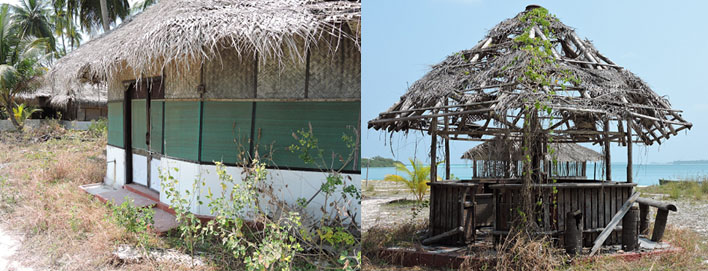
Today, instead of a luxury air-conditioned cabin, you stay in a tent so stifling it’s like living and sleeping in a mosquito-infested sauna. You don’t want to know how disgusting the toilet is. There are well-appointed air-con bungalows – for the exclusive use of visiting government officials from Delhi.
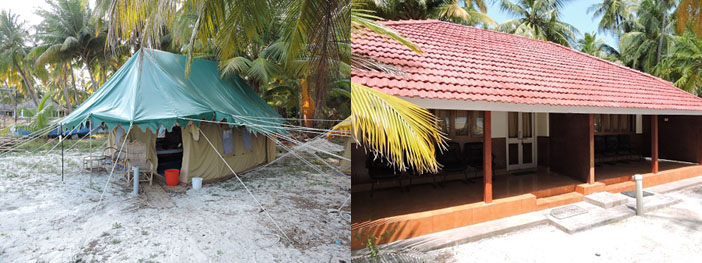
The people who work here are friendly and try their best – but they are afraid of relaying complaints to the island’s government owners for fear they’ll be fired. Here’s what epitomizes the Laccadive Lunacy: palm trees and coconuts.
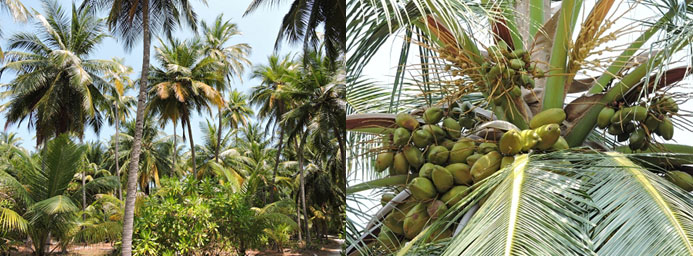
There are countless palm trees all laden with coconuts. Yet all there is to drink here is plain water in one liter plastic bottles. So when I asked for a green coconut like you see in the pic, which is filled with delicious coconut water – just slice off the top with a machete and put in a straw – they said the government officials won’t let them. They tried to explain why, they didn’t make sense, those are the rules period.
The Laccadives are a microcosm for India. It’s critical for the world it not be. India will in the next few years surpass China as the most populous country on the planet (China now has just over 1.3 billion, India just under). More importantly, its people are young with a gigantic youth cohort, while China’s are getting old fast.
India is the only country in Asia with the heft and capacity to stand up to Chicom China. The US cannot, from the other side of the world, contain by itself the Chicoms’ determination to hegemonize all of East and South Asia. Japan has been floundering with its superannuated demographics for decades. The only way to thwart Chicom Imperialism is to help India realize its potential.
Yet India is the Brazil of Asia – “the country of tomorrow and always will be.” India’s potential for prosperity is staggering. Indians are smart, industrious, and entrepreneurial. Whenever they get out of India – such as all over Southeast Asia or Africa – they waste no time setting up shops, stores, businesses, banks, and they run them well.
In India it’s another story, as the government strangles them with taxes, bureaucracy and corruption. Everyone in India knows the last person you ask for help is a policeman, as he’ll likely demand a bribe to help you. Taxes? India not only charges a large VAT tax on your restaurant bill plus a service charge, but a tax on the service charge.
Then there’s protectionism on almost a pathological level. We complain about “crony capitalism” in the US, but in India it’s the predominant way of doing business. Indian business gets government protection from upstart Indian entrepreneurs, and most especially from foreign competition.
Ask yourself – how many things have you bought in the last several years that have “Made in India” on them compared to “Made in China”? India rarely produces anything the world wants to buy because of protectionism and crony capitalism on steroids.
Ever had a Kingfisher beer? Seen it on a menu in a US bar or restaurant? Probably not. It’s the most popular beer in India – because most everywhere it’s the only beer you can drink. I was in the airport in Madras (Chennai) and was thrilled to see there was an “Irish Pub” bar. Until I was told, of course, all they had was Kingfisher – they didn’t know what Guinness was.
An almost comedic example is wine. Yes, India produces wine. You never knew that because it’s undrinkable swill. Yet it’s the only wine to consider on most any restaurant menu, as imported wine from Oz, Europe or Napa Valley is insanely expensive due to taxes, tariffs, and import quotas.
Meanwhile, China is leaving India in the dust regarding what governments should be doing, two primary examples being transportation and communication. China’s railways and highways are simply marvels, while India’s are pitiful. In much of India, “highways” are about as wide as your home’s driveway with more potholes than pavement.
Finally air transport is getting much better with a number of private carriers like Spice Jet and IndiGo competing with state-owned Air India with its old dirty planes.
In 2008, I could get fast and reliable internet connections all over China, including remote oases in Chinese Turkestan. Eight years later, internet connections in India remain just as pathetic as the roads and railways. I’ve been in India for a month, and except for a couple of big cities, it’s a constant struggle to get online.
In 2014, Indian voters elected Narendra Modi as Prime Minister giving his BJP party an absolute majority in the lower house of Parliament (the Lok Sabha), throwing out the impossibly corrupt socialist Congress Party in the process. But Congress still retains power in the upper chamber (the Rajya Sabha) and is making a fanatical effort to block Modi’s every attempt to eliminate bureaucracy and corruption while increasing competition.
And if you think media bias for the Dems in the US is bad, it can’t hold a candle to India’s. Every venue of Indian media engages in a constant never-ending barrage of attacks on Modi while praising Congress – because every journalist and editor in the country it seems is on Congress’ payroll.
Indian journos are leftist scum just like in the US, but in addition Congress and the CPI (Communist Party) are bribing them heavily and outright to demonize Modi.
India is the poster child for the world’s biggest problem: TMG – Too Much Government. The recipe for a country’s prosperity is simple: have a government provide what it must and should – police, courts, and military – with an honest and dependable rule of law, then get out of the way so its citizens can innovate, produce, and prosper.
But bureaucrats everywhere refuse to get out of the way, strangling people with ever more rules and regulations. Whether it’s in the US, the EU, now China on the brink of recession, India or elsewhere, it’s the same. And woe betide a politician who says, “Elect me and I’ll eliminate half the government jobs in the country. My purpose will not be to pass more laws and rules, but to repeal them. I vow to put all the bureaucrats running and ruining your lives out of work.”
Actually, Modi was elected on promises pretty close to this, although not quite that explicit. Now we see the consequences. A cartoonist would portray them depicting Modi trying to pry the strangling fingers of Bureaucracy off India’s throat, while getting clubbed and beaten up by Congress, the Communists, and the media.
But there’s no Indian Michael Ramirez to do so.
The beauty here in the Laccadives can be so astonishing that it seems surreal – like when the ocean and sky merge into one like a Matisse impressionist painting…
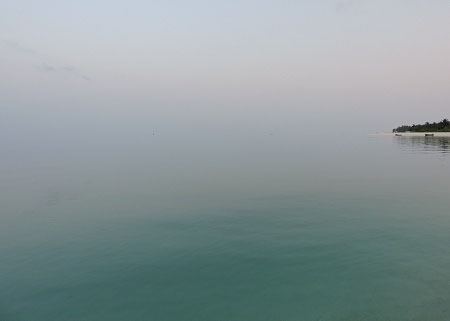
It takes your breath away. It takes your breath away what a paradise this could be, what all India could be, without government strangling it.
America became the paradise to which the rest of the world aspired as the beacon of hope because it was the one place on earth where people were free from government trying to stifle their dreams. Freedom to prosper is the American Dream – and now it too is being strangled by TMG.
Let’s hope Modi succeeds in allowing India to prosper. Let’s hope America gets its own Modi this November.


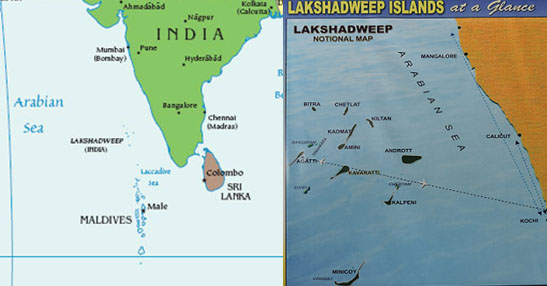
 Join the forum discussion on this post
Join the forum discussion on this post